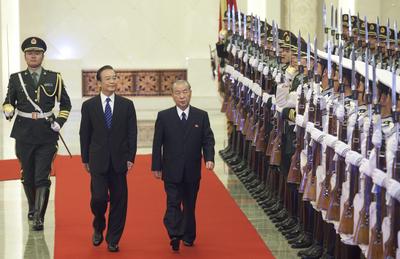Since 2008, Chinese coverage of South Korea has grown far more negative while discussion of North Korea has revealed an agenda quite different from what it appeared to be pursuing at the time of the talks in 2003–08. Given China’s support for North Korea’s objectives in restarting the talks, it is important to consider other parties’ strategic thinking regarding the Korean peninsula.
In the summer of 2011 there was more manoeuvring over the prospect of talks than many anticipated. Russia moved into the forefront, echoing China’s support for resuming the talks without North Korea having to meet preconditions (other than suspension of nuclear and missile tests), such as freezing its uranium enrichment activities. Russia joined China in moving forward with economic cooperation — preparing to forgive nearly all debts from the days of Soviet assistance, agree to a joint military drill, and, above all, press ahead with North Korea on the construction of a gas pipeline down the peninsula, which South Korea had supported in the event of genuine cooperation from the North. But South Korea seemed unlikely to agree to the pipeline anymore given its newly confiscated Kumgang resort was advertised as the North’s new Mecca for tourism, and the North ignoring its calls to apologise for the 2010 attacks. Yet facing the prospect of progressives regaining power in the December-2012 presidential election, Lee Myung-bak began to waver on how hard a line to maintain on the North. He was unlikely to reject Russia’s overtures without exploring them, and, as US-North Korean discussions were renewed, Lee Myung-bak was under pressure from the United States to at least test the North’s intentions.
In the Obama administration, in-party fighting over China’s policies concerning Taiwan and North Korea was intensifying. While the US State Department and Defence Department were intent on keeping the focus on de-nuclearisation, the National Security Council wanted to test China’s support of regional stability — exploring further the possibility of a new round of Six-Party Talks and minimising the fallout from the sale of upgraded equipment for planes to Taiwan. The US was unlikely to make a decision until North Korea proved more forthcoming on the preconditions.
Japan’s shaky political leadership was also in doubt as it contemplated a more active diplomatic stance after years of marginalisation and then months of inward-looking policies since the disaster in March. The DPJ leadership took up power in 2009 eager to boost relations in Asia. But then-Prime Minister Yukio Hatoyama alienated Washington over base relocation in Okinawa and failed to win China’s cooperation for an East Asian Community. And successor Naoto Kan’s regional policies were very timid, even prior to the disaster. Japan was least prepared for strategic thinking over Korea, even for restraining rhetoric that would alienate South Korea. New Prime Minister Yoshihiko Noda spoke strategically about US relations, but expectations remained low.
Thus the divide over North Korea has sharpened in 2011 and the Northeast Asian balance of power is at stake. China seeks a Sino-centric regional order and regards the Korean peninsula as its frontline. Russia aims to become the energy power in the region, revitalising its Far East region in time for the 2012 APEC summit in Vladivostok with plans for a north–south corridor extending to Busan in South Korea. All this has left South Korea scrambling, reliant on the US, but uncertain about its own political direction. And Japan’s lack of focus is one more reason US policy is becoming harder to formulate in the midst of a fierce domestic political struggle that is spilling over into foreign policy.
Dr Gilbert Rozman is Musgrave Professor of Sociology at Princeton University. He spent 2010–11 at the Woodrow Wilson International Center, concentrating on current Chinese writings on national identity and international relations.
This is an abridged version of a seminar presented by Dr Gilbert Rozman at The Australian National University, 17 August 2011.

